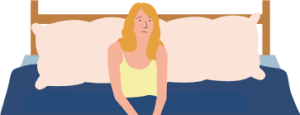Are you struggling to fall asleep or stay asleep at night? If so, you’re not alone. Insomnia affects millions of people worldwide and can have a significant impact on their physical and mental health. Sleep deprivation therapy – the technique that has been gaining popularity as an effective way to combat sleeplessness. In this blog post, we’ll explore everything you need to know about sleep deprivation therapy for insomnia and how it can help improve your quality of life.
Contents
What Is Sleep Deprivation Therapy?

Sleep deprivation therapy is a treatment for insomnia where the patient is deprived of sleep for some time. This can be done either by not sleeping at all or by only sleeping for a few hours each night. This therapy aims to break the sleep cycle and allow the patient to get a good night’s sleep.
Sleep deprivation therapy is not suitable for everyone and should only be used under the supervision of a doctor or sleep specialist. It is important to make sure that you are not suffering from any other medical conditions that could be made worse by sleep deprivation before starting this therapy.
How Does It Work?
Sleep deprivation therapy is a type of behavioral therapy used to treat insomnia. It involves restricting sleep for a certain period, typically 24-48 hours, followed by a period of normal sleep. This therapy is designed to help reset the body’s sleep-wake cycle and improve the quality of sleep.
During the period of sleep deprivation, the individual is kept awake and engaged in activities to help prevent them from falling asleep. This may include light exercise, reading, or other stimulating activities. The goal is to create a sleep deficit that will make the individual feel more tired at bedtime and help them fall asleep more easily.
After the period of sleep deprivation, the individual is allowed to sleep normally for some time, typically 7-8 hours. This can help reset the body’s natural sleep-wake cycle and improve the quality of sleep. Over time, the individual may continue to use techniques learned during therapy, such as establishing a regular sleep schedule and practicing relaxation techniques, to maintain healthy sleep habits.
Techniques of Sleep Deprivation Therapy For Insomnia

There are several techniques used in sleep deprivation therapy for insomnia, which can include:
- Total Sleep Deprivation: This technique involves staying awake for a full 24 hours or more. It is usually done under the supervision of a healthcare professional.
- Partial Sleep Deprivation: This technique involves restricting sleep to a few hours per night for several days or weeks.
- Sleep Phase Advancement: This technique involves moving the individual’s bedtime and wake time earlier each day until they are going to bed and waking up at the desired time.
- Controlled Sleep Restriction: This technique involves limiting the amount of time the individual spends in bed to only the time they can sleep. Over time, the amount of time in bed can be gradually increased as the individual’s ability to fall asleep improves.
- Sleep Compression: This technique involves compressing the amount of time the individual spends in bed to the actual amount of time they are sleeping. Furthermore, This can help to consolidate sleep and improve its quality.
Pros and Cons of Sleep Deprivation Therapy For Insomnia
Pros of Sleep Deprivation Therapy for Insomnia:
- Can be effective: Sleep deprivation therapy can be effective for some individuals with insomnia. It can help reset the body’s natural sleep-wake cycle and improve the quality of sleep.
- Non-pharmacological approach: Sleep deprivation therapy is a non-pharmacological approach to treating insomnia, which can be beneficial for individuals who prefer to avoid medication.
- Can lead to long-term improvements: In addition to immediate improvements in sleep quality, sleep deprivation therapy can lead to long-term improvements in sleep habits and patterns.
Cons of Sleep Deprivation Therapy for Insomnia:
- Can be difficult to tolerate: Sleep deprivation therapy can be difficult to tolerate, especially during the period of sleep restriction. It can cause daytime drowsiness, irritability, and difficulty concentrating.
- Potential for adverse effects: Sleep deprivation therapy can have potential risks and side effects, such as exacerbating underlying medical conditions or causing mood changes.
- Not suitable for everyone: Sleep deprivation therapy is not suitable for everyone, and it should only be used under the guidance of a qualified healthcare professional. Individuals with certain medical conditions or mental health disorders may not be suitable candidates for this therapy.
- Limited evidence: While sleep deprivation therapy is effective for some individuals with insomnia, there is limited evidence to support its long-term effectiveness or safety. Furthermore, More research is needed to fully understand its benefits and risks.
Overall, sleep deprivation therapy can be a useful tool in the treatment of insomnia, but it should be used cautiously and only under the guidance of a qualified healthcare professional.
Sources To Take Sleep Deprivation Therapy For Insomnia

Here are different sources where you can seek guidance and support for sleep deprivation therapy for insomnia:
- Sleep specialists: Sleep specialists are healthcare professionals who specialize in the diagnosis and treatment of sleep disorders, including insomnia. They can evaluate your symptoms and recommend appropriate treatments, including sleep deprivation therapy.
- Primary care physicians: Your primary care physician may be able to evaluate your symptoms and recommend treatments for insomnia, including sleep deprivation therapy. They can also refer you to a sleep specialist if necessary.
- Mental health professionals: Mental health professionals, such as psychologists or psychiatrists, may be able to help identify and address underlying mental health conditions that may be contributing to your insomnia. They can also provide support and guidance for sleep deprivation therapy.
- Sleep clinics: Many hospitals and medical centers have sleep clinics that specialize in the diagnosis and treatment of sleep disorders, including insomnia. These clinics may offer sleep deprivation therapy as a treatment option.
- Online resources: Many online resources provide information and support for individuals with sleep disorders, including insomnia. However, it is important to be cautious when using online resources and to verify the credibility of the source. These sources are Mantracare and Therapymantra.
Tips To Take Sleep Deprivation Therapy For Insomnia

Here are some tips for taking sleep deprivation therapy for insomnia:
- Follow your healthcare professional’s instructions: Sleep deprivation therapy should only be undertaken under the guidance of a qualified healthcare professional. Follow their instructions carefully to ensure the therapy is effective and safe.
- Plan: Before starting the therapy, plan for the period of sleep restriction. Schedule activities that can keep you awake and alert, such as exercise or socializing with friends.
- Stay active during the day: Staying active during the day can help you feel more alert and less sleepy during the period of sleep restriction. Exercise, spend time outdoors, or engage in other activities that keep you moving.
- Avoid stimulating activities before bedtime: Avoid activities that are stimulating, such as watching TV or using electronic devices, in the hours leading up to bedtime. Instead, engage in relaxing activities such as reading or taking a bath.
- Keep a sleep diary: Keeping a sleep diary can help you track your progress and identify patterns in your sleep habits. Record the time you go to bed, the time you wake up and any factors that may be affecting your sleep.
- Practice good sleep hygiene: Good sleep hygiene involves creating a sleep-friendly environment, such as keeping your bedroom cool and dark, establishing a regular sleep schedule, and practicing relaxation techniques such as deep breathing or progressive muscle relaxation.
- Don’t drive or operate heavy machinery during the period of sleep deprivation: Sleep deprivation can cause drowsiness and impair your ability to drive or operate heavy machinery. Avoid these activities until the therapy is complete and you have had adequate sleep.
Conclusion
Sleep deprivation therapy can be an effective form of treatment for those suffering from insomnia. The idea is to reset your circadian rhythm and allow you to establish healthy sleep patterns again. Though this approach may seem counterintuitive, it has been proven to help in some cases. While sleep deprivation therapy should never replace traditional treatments like medication or CBT-I, it may be a useful addition to your overall plan for treating chronic insomnia and helping you get the restful sleep that you need.
For more information, please contact MantraCare. Sleep is an essential part of our daily routine and it plays a significant role in maintaining a healthy body and mind. If you have any queries regarding Online Insomnia Counseling experienced therapists at MantraCare can help: Book a trial therapy session


